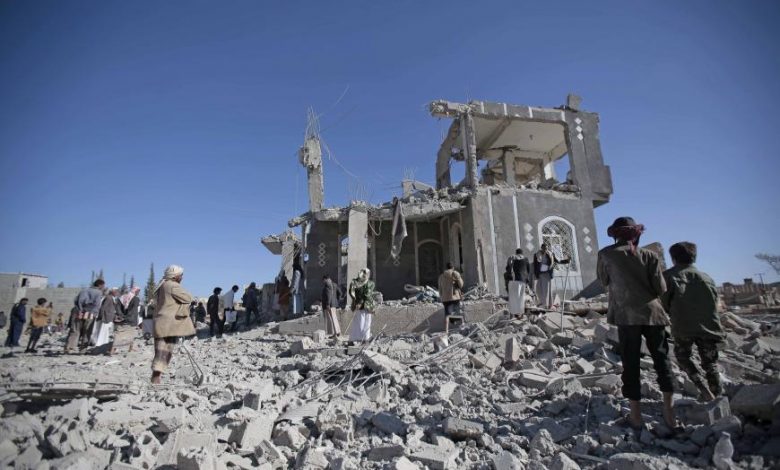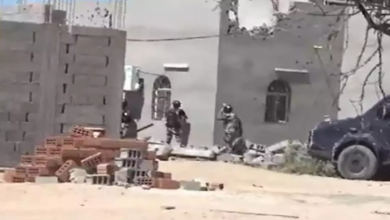HRW: US Assistance to Saudi Risks Complicity in War Crimes in Yemen

Human Rights Watch said that US assistance to the Saudi-led coalition risks complicity in war crimes committed in Yemen. This conflict resulted in the most humanitarian crisis in recent history, leaving almost a quarter-million people dead and the country’s infrastructure destroyed. The coalition war in Yemen also resulted in millions of people leaving their homes and the vast majority of Yemenis in famine.
The UN Security Council panel of experts has reported that Iran has continued to supply the Houthis with weapons for several years. The US has also supported the Saudi and UAE-led coalition politically, particularly by shielding the coalition from criticism and enabling the United Nations Security Council to focus its scrutiny only on the Houthis, as seen in Resolution 2216, drafted by the United Kingdom in 2015.
Since 2015, the United States has supplied Saudi Arabia and the UAE with billions of dollars worth of weapons, training and logistical support, including aerial refueling until 2018, as the coalition conducts its aerial bombing campaigns. Human Rights Watch has documented the coalition’s use of US-manufactured weapons in at least 21 apparently unlawful attacks under the laws of war. These attacks include the March 15, 2016, attack on a market in the village of Mastaba in northwestern Yemen, which killed at least 97 civilians, and the attack on October 13, 2016, on a funeral ceremony in Yemen’sYemen’s capital, Sana’aSana’a, which killed at least 100 people and wounded more than 500, including children.
Mounting evidence shows that parties to the conflict, the coalition as well as the Houthi armed group, continue to commit serious violations of international human rights law and international humanitarian law. On January 21, coalition warplanes struck a detention center in Sa’adaSa’ada governorate, northern Yemen, resulting in dozens of casualties. According to a local nongovernmental group, Mwatana for Human Rights, some detainees who survived the strikes were then gunned down by Houthi forces on the ground while they tried to flee.
The Houthi armed group also continues to launch indiscriminate attacks into populated areas, including into internally displaced people’s camps in Yemen’sYemen’s Marib governorate. Despite the ongoing toll on civilians, the US continues to sell weapons and provide training and logistical support to the coalition.
One recent sale approved by the Biden administration happened in December, when Raytheon, a leading US defense company, sold $650 million of air-to-air missiles and associated equipment to Saudi Arabia. In response to a Human Rights Watch 2018 inquiry about the steps Raytheon takes to ensure protection of civilians, Raytheon’sRaytheon’s vice president, Timothy F. Schultz, wrote that “Raytheon sales of munitions to Saudi Arabia have been and remain in compliance with US law and do not violate US or international legal requirements applicable to the company.”
Raytheon and other US companies operating in the weapons sector have responsibilities under the Organisation for Economic Co-operation and Development Guidelines for Multinational Enterprises and the UN Guiding Principles on Business and Human Rights to assess the impacts of their operations, sales and services, based on international human rights requirements and the laws of war. While the United States government facilitates the company’s weapons sales, the company says it complies with US law and policies. There are still serious concerns that Raytheon is not meeting its human rights responsibilities as its munitions continue to be used to commit violations of international humanitarian law.
Even though the US government is aware of credible allegations that US-made weapons are being used in violation of international humanitarian law, the US has possibly violated its own obligations by continuing arms sales to the coalition. Government officials could be legally liable for war crimes in Yemen, a consideration raised in a State Department Inspector General report in 2020.
The US condemns likely war crimes committed in other armed conflicts, such as those by Russia in Ukraine, but continues to support the coalition that is committing similar violations in Yemen. Yemeni civilians have also told Human Rights Watch that by supplying weapons used to target them, the US has contributed to antagonism, pain and resentment. Yemenis say that they are well aware that some of the bombs that fall on their homes and heads are made in the US, as weapon remnants found at strike sites by journalists, researchers and others have repeatedly shown.
The US continues to show an inadequate commitment to ensuring accountability for the possible crimes of its allies, Saudi Arabia and the UAE, and for its own role. After seven years of ignoring rights groups’ warnings of potential US complicity in serious crimes in Yemen, Washington needs to reverse course and take concrete steps to end its complicity, including by suspending weapon sales to Saudi Arabia and the UAE until they curtail unlawful airstrikes. The US should also pursue credible investigations and prosecutions into previous alleged violations.





